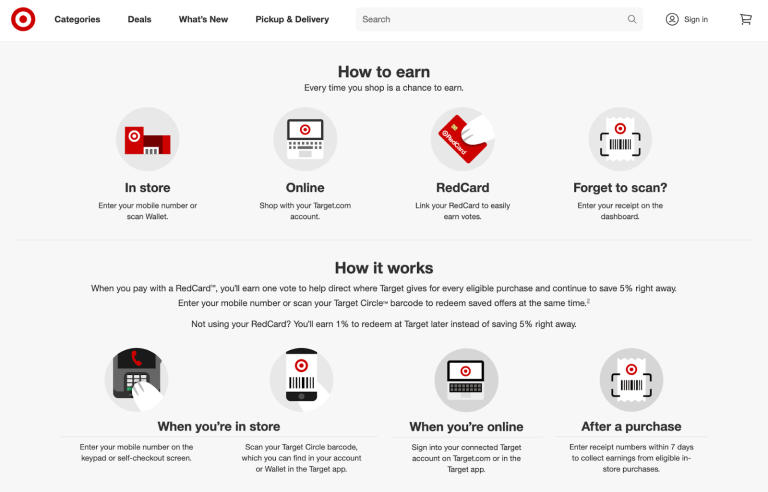Want to know how to make an online store for free?
If you’re searching for a free ecommerce website builder, this is the place to find it. Here, we explore the 14 best free ecommerce website builders available and include the pros and cons of each one.
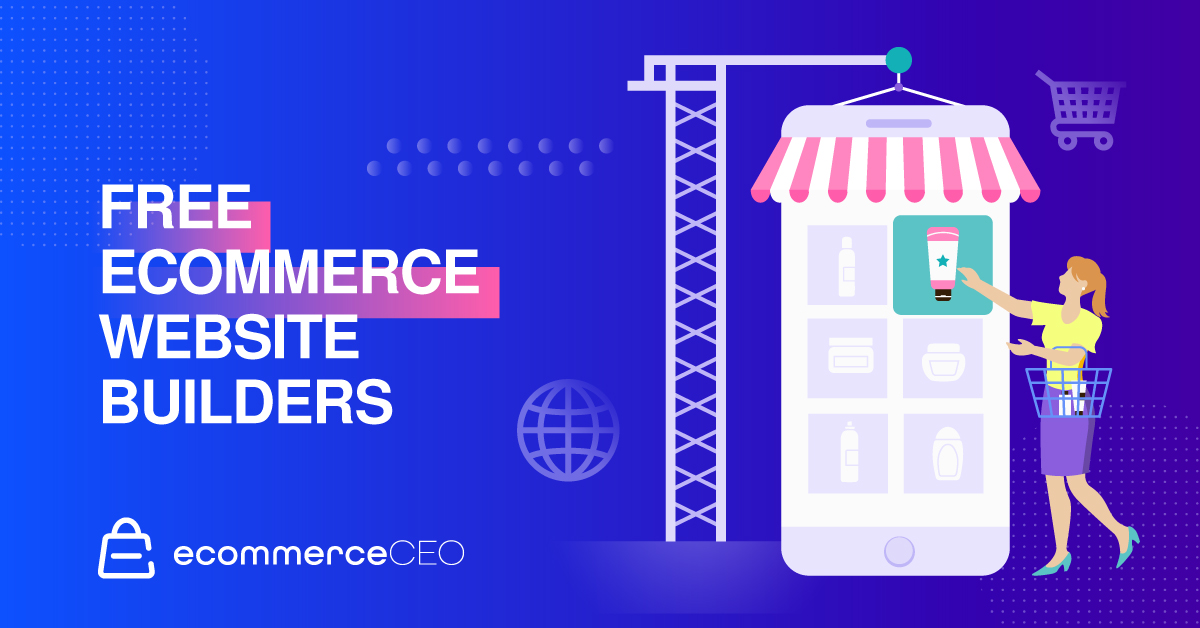
Some of these tools enable you to create an online store for free, and others are free to set up an online store but charge you to sell your goods. Some of them are pretty easy to use and simple to get the hang of, while others have a bit of a learning curve.
Because time is money (and if you are reading this article, you are probably looking for ways to save money), we researched and put together a list of the best free ecommerce website builders so that there is one less thing on your to-do list. If you’re starting an ecommerce store on a budget, here are the free tools that you can use.
Finding the Right Free Ecommerce Platforms for Your Business
While finding free plans and free trials is possible, you will almost always have to pay something to get your online business up and running. You can still end up paying for website hosting, transaction fees, and other miscellaneous extensions when starting an ecommerce website, even if the platform itself is free.
However, your goal in starting new online stores should be finding an ecommerce platform that will help you grow your business at a low cost without restricting how you can run or operate your business.
The main perks you should look for in free website builders are easy-to-use, powerful features, and mild (if no) limitations on payment processing.
It all depends on you and your business, but you rarely want the headache of needing a professional designer to help you start your ecommerce store – that’s what the website builder should be helping you with.
With these things in mind, let’s look at the 14 most popular free ecommerce website builders to consider when starting your online business.
The Best Free Ecommerce Platforms
While you can use these builders to sell without paying any expenses, there are many limitations and/or commission fees involved. We consider them better for someone with a small online store or looking to make some money on the side.
Square Online
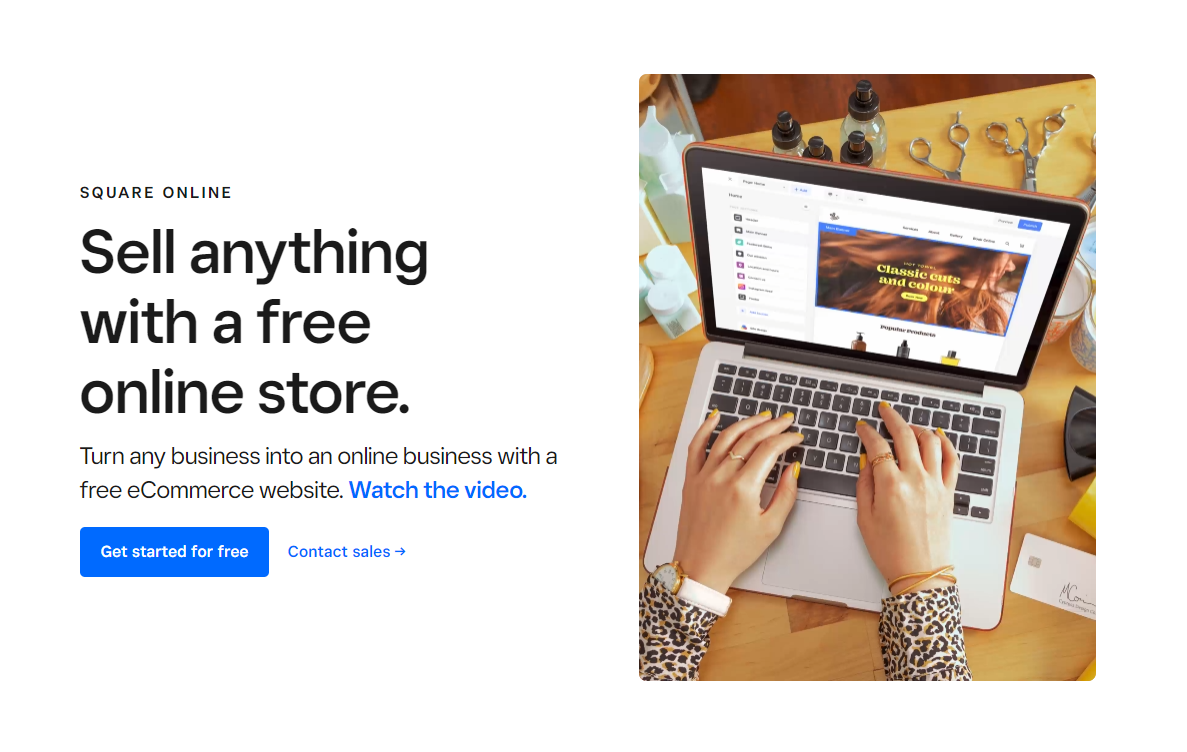
The free plan offered by Square Online provides all the ecommerce features needed to get your business started. If you have a large Instagram following, Square Online is a good option because it includes Instagram integration as part of its free plan. That way, your followers can conveniently buy your products through Instagram and will only need to tap to be redirected to your online store, which is amazing if you want to boost your online presence. On top of offering a free plan, you can opt for a free trial with one of their more expensive plans.
The Free Plan includes:
- Free website with SEO tools
- Pickup, delivery & shipping
- Sell on Instagram & Facebook
- Accept Afterpay
- Self-serve ordering
- Sync with Square POS
Pros: Free plan with social media integration and the ability to create coupon codes, order-status text alerts, and contact forms. Further, there is no limit on the number of digital or physical products you can sell.
Cons: To process payments, Square Online charges a flat fee of 2.9% and an additional 30¢ per transaction.
Sellfy
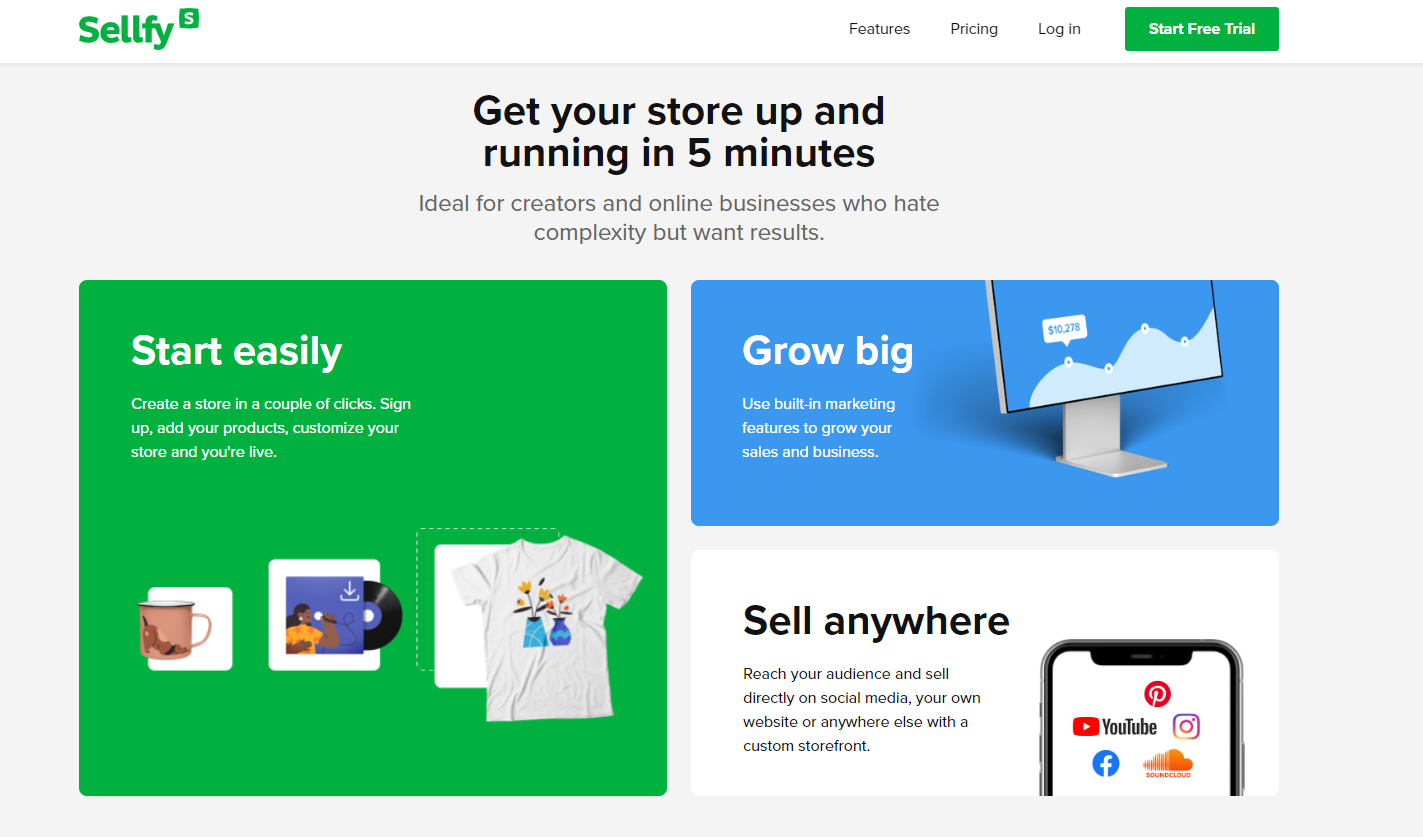
Sellfy is a free ecommerce platform for creators, founded in 2011 with the mission “to empower creators from around the world to earn a living doing what they love.” They offer a unique product that enables you to sell both digital and physical products. You cannot sell digital products with the free online store, but there are plenty of features you can take advantage of for free.
The Free Plan includes:
- Up to 10 products
- Print-on-demand products
- Physical products
Pros: There are SEO options available and zero transaction fees. Sellfy is also non-technical and easy to use.
Cons: Digital products only come with a paid plan, and you’ll still be required to give your credit card details upon sign up to cover print on-demand order fulfillment. Additionally, you’ll need to use the sellfy.store free domain.
WebStarts
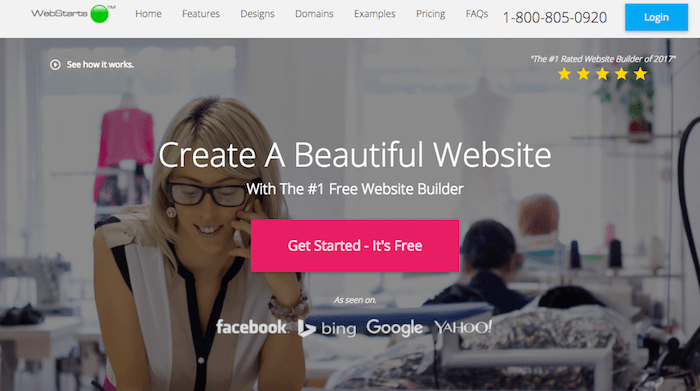
Primarily known for their online store builder, Webstarts lets you set up an online store at no cost. It is, in essence, a pretty generous free plan. This is likely the reason 4 million people use it for their ecommerce platform.
Like Wix, WebStarts is a smooth-sailing experience and lets you build your ecommerce website hassle-free. They can also be adjusted for mobile screens because templates aren’t automatically responsive. The interface is old, but it’s decent for a free program.
The Free Plan includes:
- Unlimited pages
- 1 GB cloud storage
- 1 GB/month bandwidth
- Notification Center
- Live Chat
Pros: You can sell digital items and physical goods, they offer a good variety of payment methods (PayPal, Stripe, WePay, Authorize.Net), and their ad is in the footer, so it’s not an eyesore on your website.
Cons: SEO options are not great, and there are no SKU numbers (although you can still track your inventory).
Mozello
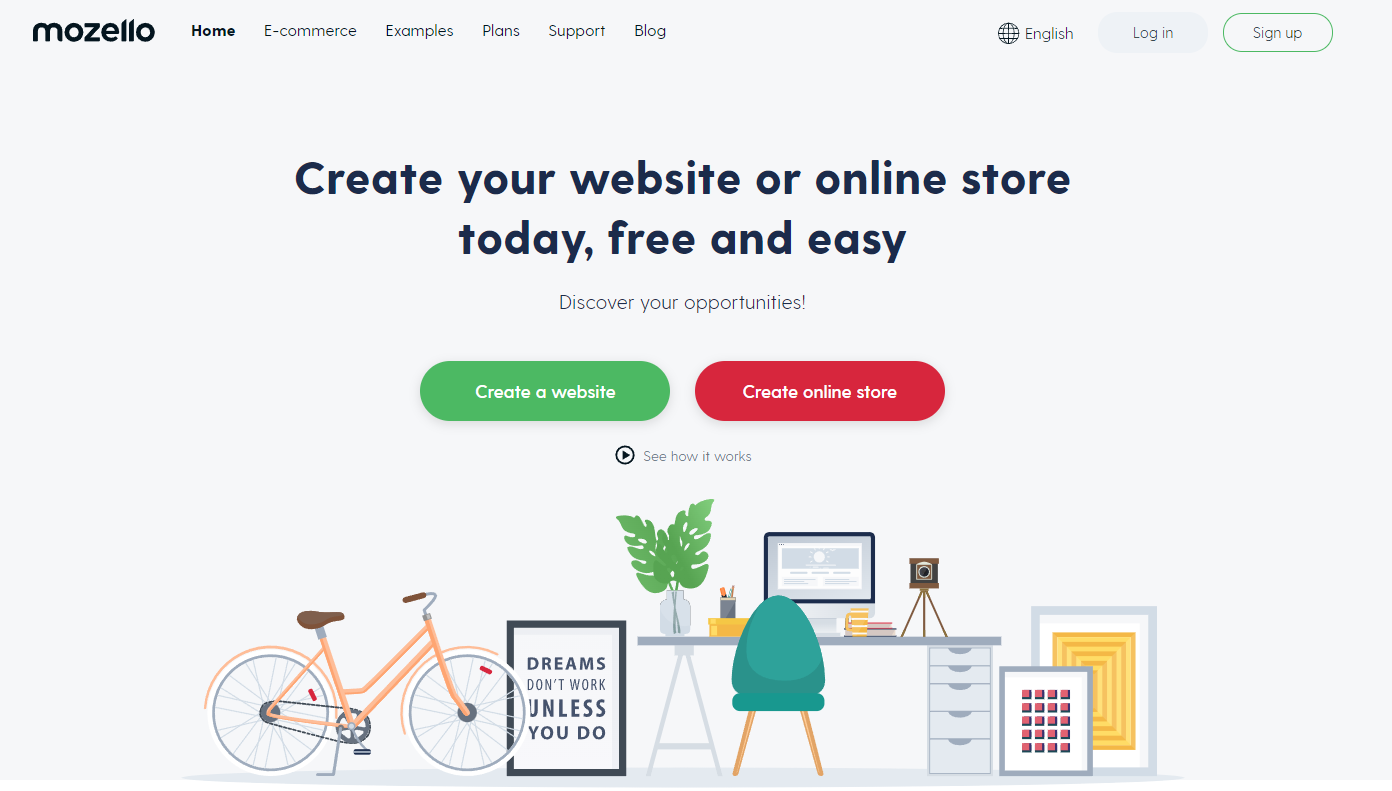
Mozello offers one of the best ecommerce features that many ecommerce website builders lack – the ability to create multilingual websites. Their free plan allows up to 5 products in your online store (this includes one product option and five product variants). Overall, if you own a small retail shop that only sells physical products and not any digital ones and you want to reach out to customers who speak different languages, Mozello may very well impress you.
The Free Plan includes:
- Mobile device support
- Multilingual websites
- Marketing features
- Endless design variations
- SSL security
- 500 MB of storage
Pros: Mozello has no transaction fee, inventory tracking, and multilingual options.
Cons: You won’t be able to sell digital products with the free plan, and there is a limit on the number of products you can sell for free.
Freewebstore
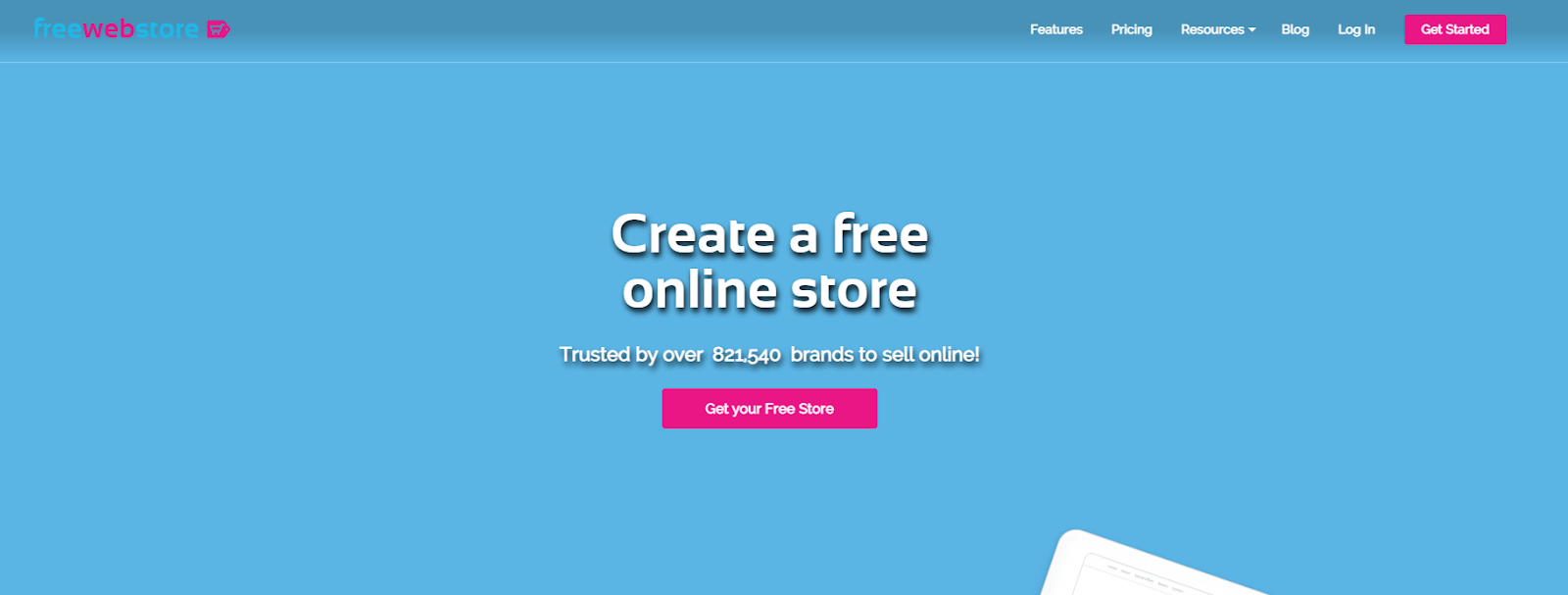
A fully hosted eCommerce website, along with a custom domain name of your choice, is offered at no cost with freewebstore. While most of the other free website builders on our list have a limit to the number of products you may sell with their free plan, freewebstore doesn’t. On the other hand, they restricted annual turnover to $30,000. It depends on what your ecommerce business is, but for you, this may be the best option.
The Free Plan includes:
- Unlimited products, storage, and bandwidth
- 0% commission
- Standard customer care
- Customer account options
- Custom domain options
Pros: Freewebstore has free SSL, no transaction fees, a number of online payment processors, and no cap on how many products you can sell.
Cons: You can’t sell digital products, and the platform is pretty dated.
Weebly

The intuitive drag-and-drop editor means Weebly is easy to understand and use. Moreover, it offers templates making it one of the most popular website builders to provide a free plan. One way in which this free website builder stands out from the competition is by being extremely generous when it comes to their free plan. They do not limit the number of products users may list.
That said, even the paid plans with Weebly are affordable. Their cheapest plan paid annually will cost you $6, while their more in-depth, costly performance plan will set you back $26 if paid annually.
The Free Plan includes:
- SSL Security
- Tax calculator
- Unlimited products
- Inventory management
- SEO
- Lead capture
- Instagram feed
- Chat & Email support
Pros: Weebly is very easy to use and has a great blog feature to go along with your online store.
Cons: There are no offline payments available, and users from outside the U.S. claim they don’t have access to the free plan. Further, the free plan does not allow the selling of digital products.
Strikingly
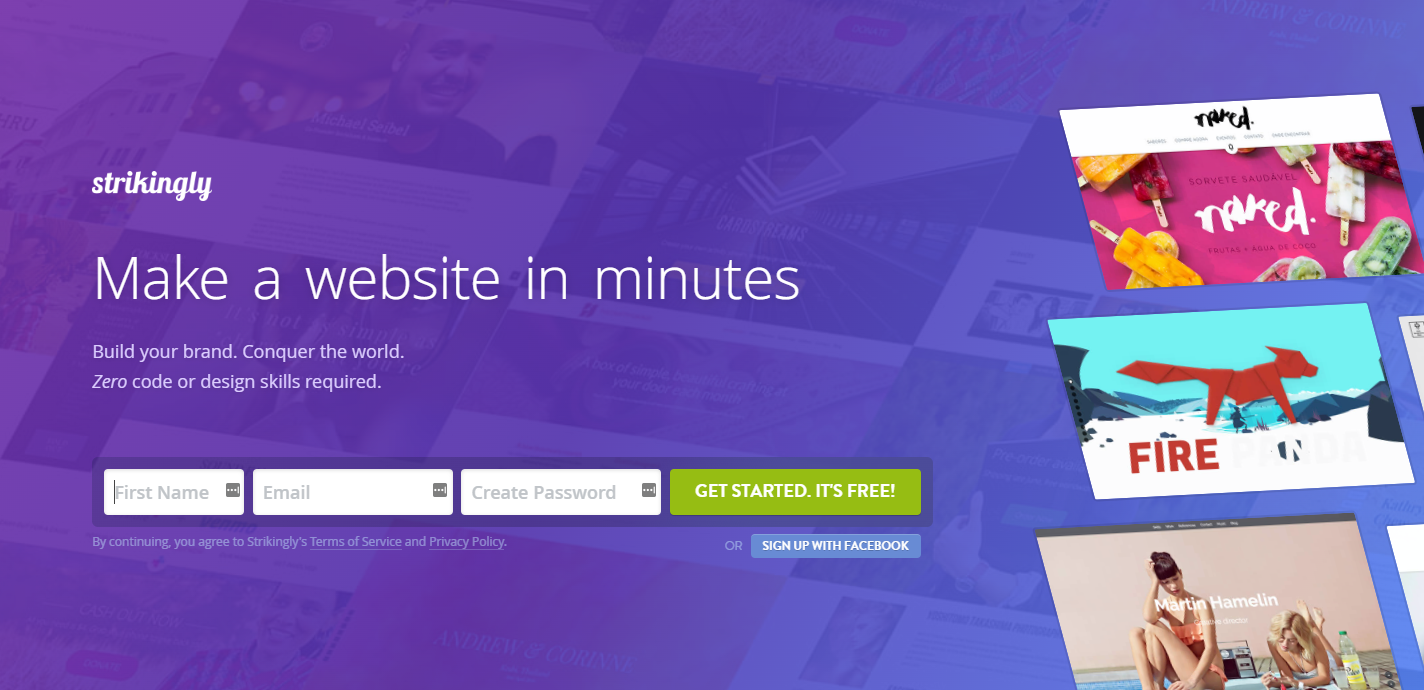
A common goal of Strikingly is to allow you to “build your brand” and “conquer the world.” Similar to the eCommerce website builders mentioned in our list, Strikingly also provides different pricing methods. They offer a free plan, but it only lets you have one product per site, though the free account has an unlimited number of free sites to make. So, if you want a template with a single-page layout that only features one product, this might be the one to try.
The Free Plan includes:
- Unlimited free sites
- 5 GB monthly bandwidth
- 500 MB storage
- 24/7 support
- Invite collaborators
Pros: Their designs are sleek, modern, and responsive. They also offer a variety of payment processors.
Cons: Their SEO is limited, as well as their template options. And you can only sell one product. The free plan does not allow digital products.
The Best Ecommerce Platforms With Free Trials
These are builders that offer more powerful plans that can be tried out for free. Free trials usually last for about two weeks, so these platforms are perfect for trying out a plan and deciding if it’s worth the cost.
BigCommerce
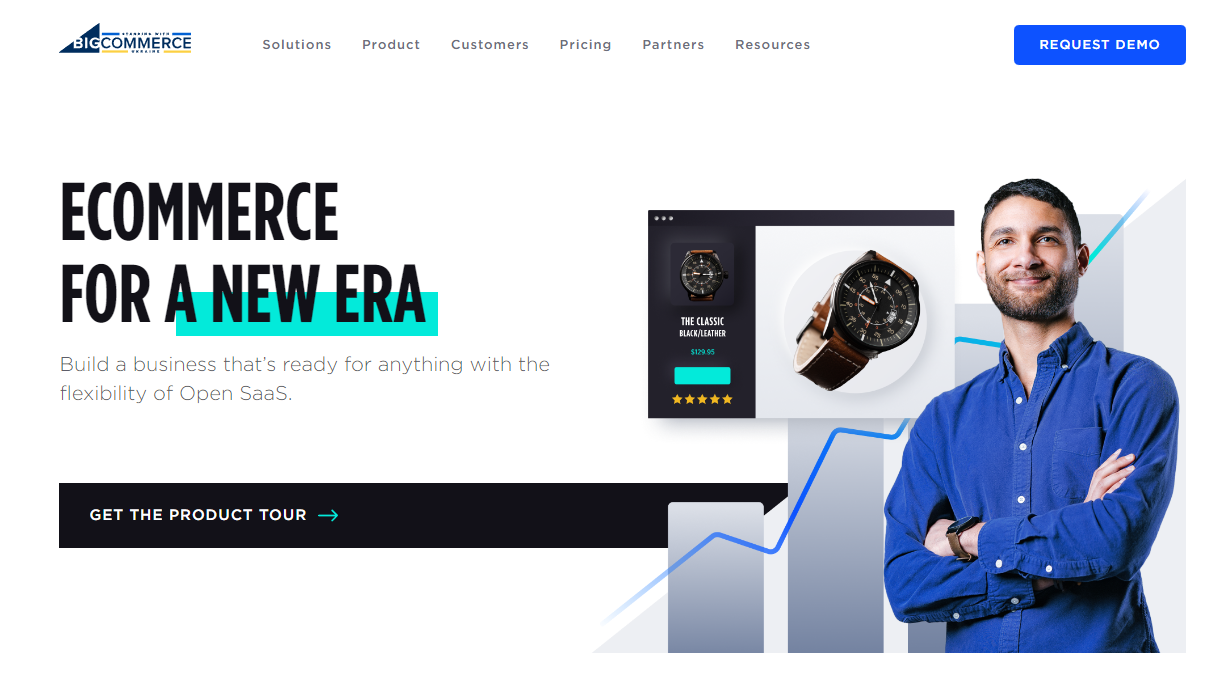
Overall, BigCommerce is the best ecommerce website builder. Of all the different platforms, BigCommerce is one of the most popular, and for a good reason. They have processed over 9 billion dollars worth of transactions online and are utilized by tens of thousands of stores.
Although there is no free plan, it does offer free trials if you’ve got the budget for it. You can pay anywhere from $29 to $249+ per month for a limited number of free themes (and there are even more paid options available) to use as your site’s web design. Using different selling channels? No problem. If you use multiple sales channels, such as Facebook and Amazon, BigCommerce will give you a centralized location to handle all your sales data.
BigCommerce’s advanced features allow you to sell internationally and give you SEO-optimized stores. However, these features are more complex to use. If you want a more in-depth review of BigCommerce, read our article here.
Pros: It doesn’t require a lot of tech knowledge, great for SEO and mobile-friendly design templates. You can also sell an unlimited number of physical and digital products.
Cons: The free themes are not very diverse, essentially forcing you to pay for more options. You are limited on how many online sales you do per year before needing to upgrade your plan. And the typefaces are quite limited, with no compatibility for custom typefaces.
Shopify
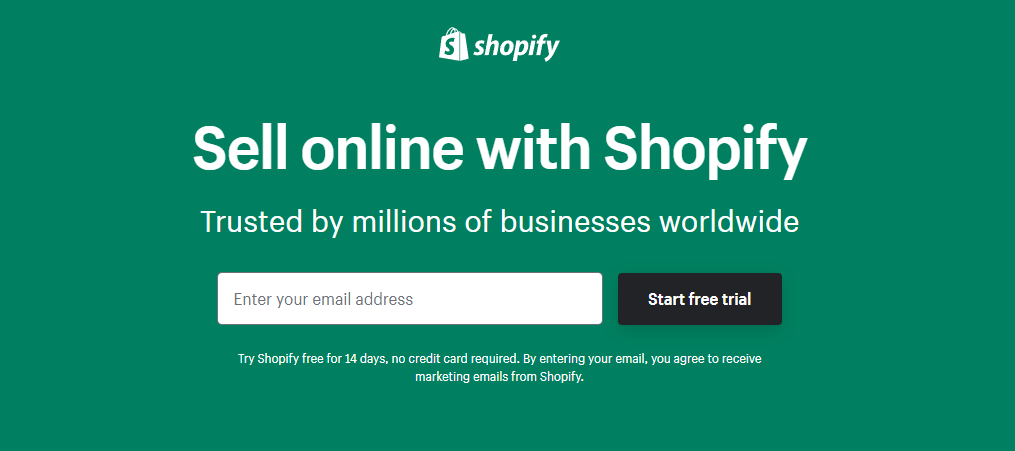
Like BigCommerce, Shopify is not free to use, but you can take it for a test spin with a 14-day free trial. Shopify was founded in 2004 and is one of the most recognizable ecommerce website builders. In many ways, using Shopify is a simple and intuitive process. The Basic Shopify plan costs $29 per month, which includes web hosting. With Shopify, you can do almost anything, and it’s integrated with tons of apps.
In order to take advantage of a large Amazon audience, you should use Shopify. This can allow you to sell products from your Shopify store directly on Amazon. For shoppers that want to pay with a credit card, Shopify accepts 70 payment gateways, but it will take time to set it up.
Pros: Simple, easy-to-use website building process. You don’t need any coding experience to use this platform. Shopify has email marketing features already built into the platform, so you can make, send, and track messages right in your Shopify dashboard. With the basic plan, you can sell digital and physical goods and get access to marketing tools.
Cons: If you want to have features like adding product reviews or letting customers use multiple discounts, then you need to upgrade to Shopify Plus and download extensions.
Wix

Although Wix has no free options available, it is excellent for small businesses and does offer a free trial period before you decide to make a commitment. Wix Ecommerce boasts an affordable price tag, strong phone support, amazing theme design, and an easy-to-use platform. Wix is great for non-techy store owners who want a simple, intuitive design that they can manage themselves (without a designer).
Wix offers over 800 fully-customizable templates that are professionally designed and is great for SEO. If you want something truly easy to manage, Wix is the perfect option for you. That being said, it doesn’t allow for complete control over your site. When you use Wix, you don’t get a say in your website’s hosting, updates, or uptime. Essentially, if you want an ecommerce platform that just takes the reigns and you don’t mind a free trial, then Wix is what you’re looking for.
Pros: In addition to simplicity, the themes from Wix are high-quality, and there are a lot of free options included. And you can sell both digital and physical products.
Cons: If you create your site on Wix, it’s incredibly difficult to transfer your website away from Wix at a later time if/when you’ve outgrown its features. Further, paying for a premium plan only applies to one site.
My Online Store

With headquarters in the Netherlands, MyOnlineStore is relatively new to the scene and, even though they’re in their beta stage, is trusted by around 40,000 online retailers. There’s not a lot of information out there about this new company, but stay tuned – they’re one to watch.
This website builder used to offer a free plan called MyOnlineStore GO. However, they have since ditched that option and now only have three payment plans available: grow, pro, and premium.
Pros: They have modern and response designs, many different types of payment options (including Bitcoin), and are multilingual.
Cons: As of right now, they only offer a free trial and no free plan. Their templates are quite limited, and they can be a bit pricey when you go premium.
The Best Free Ecommerce Software
Software tools are different from website builders because they are more sophisticated, complex, and powerful. They can be installed for free, but some additional costs are involved to set them up.
WooCommerce (WordPress)
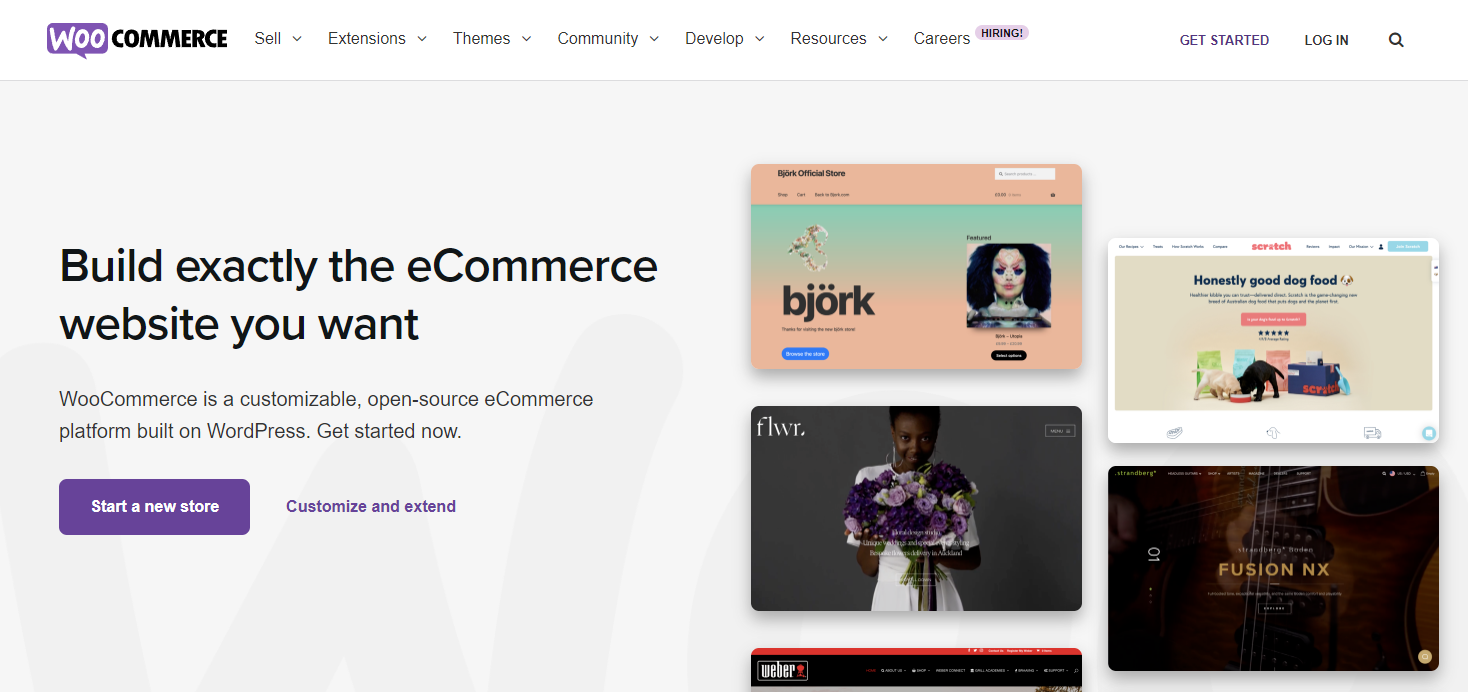
WooCommerce is available as a plugin for WordPress. This plugin is free of charge for those with a WordPress account. However, if you want to access the more complex, extra features of WooCommerce, you’ll have to pay a fee.
For those with a grasp of WordPress site, Woocommerce will come easily. As your existing website expands, you will need to choose paid add-ons to take your business to the next level. That said, it’s an accessible and dependable product that offers good tools for doing ecommerce. It’s not uncommon for the updates to cause problems if you’re not careful. Regardless, the SEO features and the performance of WordPress cannot be denied.
Even for those using the free plan, WooCommerce gives you access to powerful features that are great for both small and large stores such as tax and inventory management, secure payments, and shipping integrations.
Pros: Great for SEO and integrates with SSL. There is also the added bonus of a very sleek product presentation that will impress your customers. You can sell digital products with the help of a plug-in.
Cons: If you are new to web design, this plugin is not the easiest to use. It also starts getting pretty pricey when you want to buy additional add-ons and themes.
Ecwid
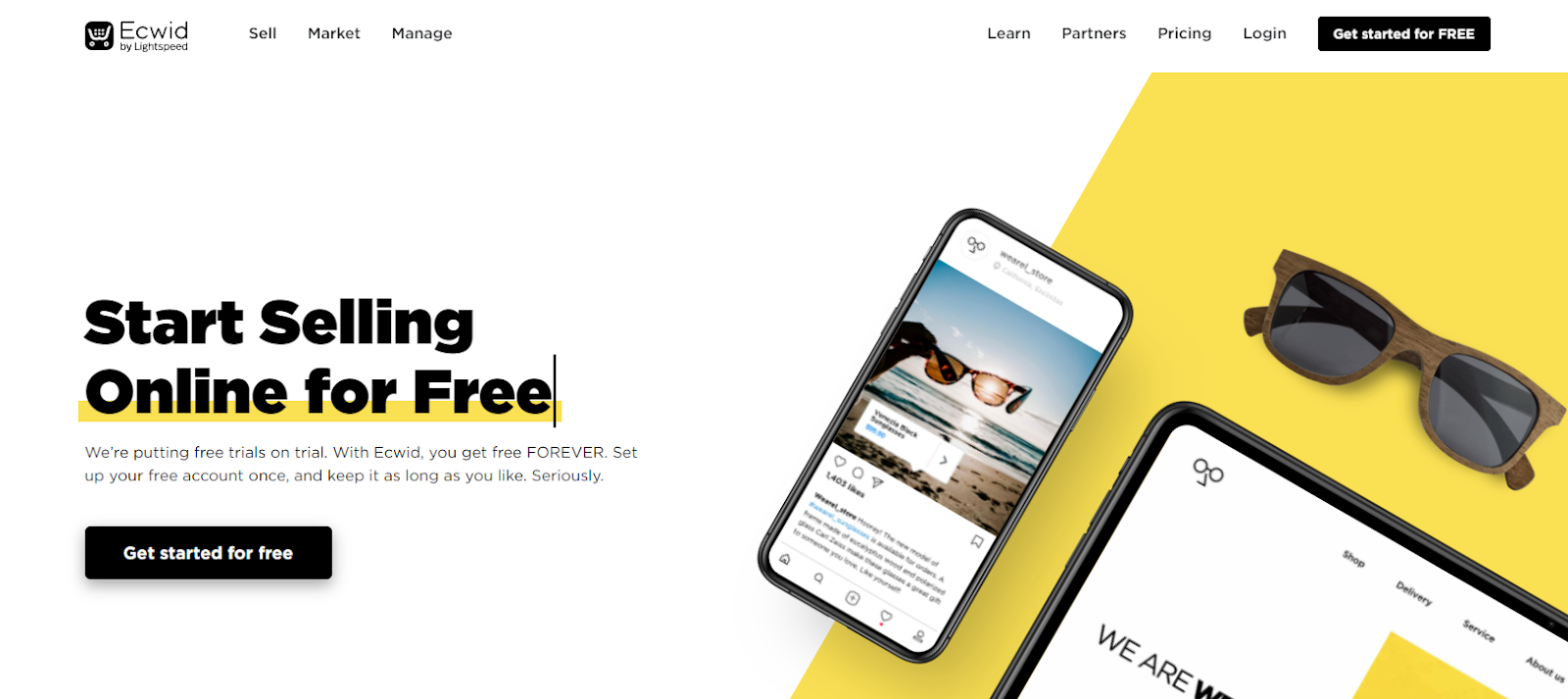
Ecwid does things a bit differently than other website builders. The website builder also features a plugin that can be added to existing websites. This means that you don’t have to start from the beginning if you already have a website in place completely. Therefore, Ecwid can be easily added virtually anywhere, including social media sites. The free version of the plugin lets you sell ten items and is available in 50 languages.
The Free Plan includes:
- Zero transaction fees
- Social media advertising
- Mobile responsive shopping cart
- 10-product limit
- Unlimited bandwidth
- Tax invoices
Pros: Powerful features like coupons, article management, and taxing. It has over 20 payment processors, SSL integration, can sell digital products, and is very intuitive.
Cons: It could be better with SEO.
PrestaShop
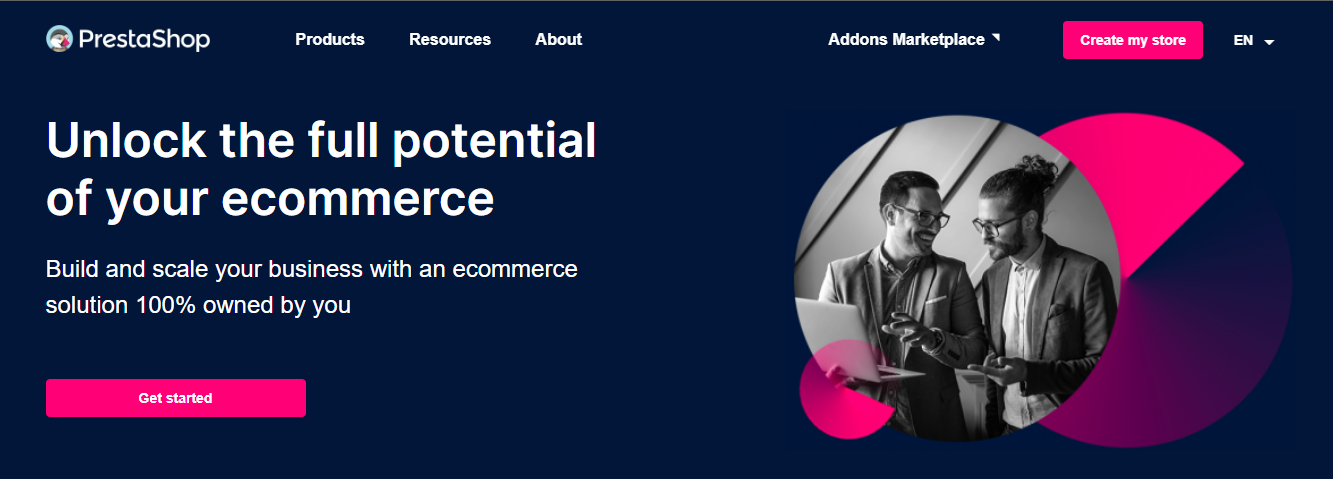
Like Woocommerce and Ecwid, Prestashop can be used if you already have an existing site up and running. It’s 100% free to download; however, costs tend to add up quickly if you find yourself needing to download any add-ons. Unlike the other ecommerce platforms like Shopify, there are no tiered pricing plans. PrestaShop is an open-source platform whose pricing is based on hosting and theme costs.
It’s a solid option if you want to do business internationally. PrestaShop has a huge international support community and employees, offices distributed around the world, and multilingual functionality. Using PrestaShop’s language support, your site can be translated into 65 languages. PrestaShop will help you tailor your store for international customers.
Pros: PrestaShop has multilingual options, decent content management features, and is pretty easy to use. You can also use it to sell digital products.
Cons: It can get pricey when you start needing premium themes and extensions such as Instagram and Google Shopping.
Wrapping Up
Although you can get a pretty decent free plan from some of these website builders, in the long run, you’ll probably need to pay for a better plan. I would suggest taking a look at the pricing of other plans and seeing which ones will work better for you and your business. Many plans for Ecommerce website builders are pretty affordable, especially if paid for annually.
The moral of the story, do your research! Having a free plan is awesome, but switching website builders can be a major headache, and by shopping around for other plans you may have to switch to later, you’ll only be thanking yourself later! Fortunately, we’ve compiled a list of the best ecommerce website builders both free and paid in another article.
<img src="https://thegateway.net.au/wp-content/uploads/2022/06/14-of-the-best-free-ecommerce-website-builders-in-2022-1.jpg" class="ss-hidden-pin-image" alt="Ecommerce Website Design" data-pin-url="https://www.ecommerceceo.com/free-ecommerce-website-builders/" data-pin-media="https://thegateway.net.au/wp-content/uploads/2022/06/14-of-the-best-free-ecommerce-website-builders-in-2022-1.jpg" data-pin-description="14 of the Best Free Ecommerce Website Builders in 2022“>

